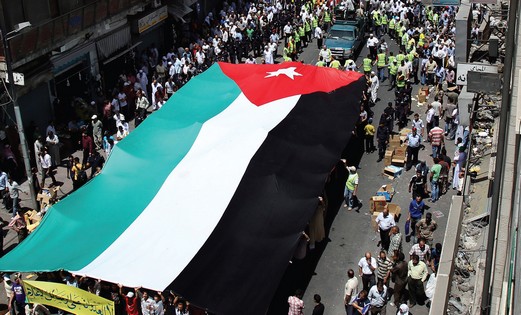UPDATES
BBC admits bias in its “Arab Spring,” Itamar coverage
June 29, 2012 | Andrea Nadel

The eternal struggle against biased Middle East reporting in the mainstream media is once again making headlines, however this time it is for a surprisingly positive development. In a rare admission this week of what many who follow the organization have long observed (for previous AIJAC coverage on media bias, click here, here and here), the British Broadcasting Corporation (BBC) admitted that significant aspects of its coverage of the “Arab Spring” uprisings had been biased – and has also apologised, albeit somewhat half-heartedly, for a failure to report one of the most heinous terror attacks in recent years against Israelis.
A report issued by the BBC Trust, the BBC’s governing body, on the Arab Spring concluded that
“the BBC’s coverage could have included more extensive follow-up of stories in some countries, a fuller examination of the different voices which made up the opposition to various incumbent governments, and in some places a broader range of international reactions to news events.”
What’s more, the report also points out more serious flaws in the BBC’s coverage, including the fact that coverage favoured certain countries at the expense of others, specifically those countries whose leaders were not toppled by the unrest, and that international responses to the uprisings were not evenly reported. The BBC Trust reported that
“[Edward Mortimer, the former United Nations Director of Communications who conducted the investigation,] Expressed concern about the drop in coverage of Egypt after President Mubarak’s fall; the delay in covering human rights abuses by rebel forces in Libya; the lack of context in early coverage of Bahrain and later sporadic coverage of the country; lack of context in the television coverage of Syria such as the composition of the opposition and the impact of events on regional stability and minorities; and a fall-off in coverage of Yemen, Algeria, Morocco, and Jordan […]”
One of the most disconcerting revelations in the BBC Trust’s report is that the BBC’s content analysis lacked
“[…] reference to the authentification of User Generated Content (UGC) such as mobile phone footage. He [Mortimer] noted that there does not appear to be any clear or consistent policy about the use of the word ‘regime’ to describe the governments of foreign countries.”
Indeed, the UK newspaper the Daily Mail has noted that “the BBC failed to warn viewers with ‘caveats’ about the ‘authenticity’ of such footage in 74 per cent of cases.” (emphasis added)
Moreover, admissions from top BBC staff reveal a great deal about the lapse in professionalism that characterised the network’s ‘Arab Spring’ coverage. BBC Head of News Helen Boaden reportedly “admitted that her journalists got carried away with events and produced ‘over-excited’ reports”:
“‘In the conflict in Egypt in the beginning… we might have sounded over-excited – you can take on the colour of who you’re with. I had to say ‘just be careful about your tone.’
‘In Libya too, where we were essentially embedded [with the rebels] at the start, we might have sounded over-excited – you have to be careful if you can’t get to the other side of the story.'”
The Daily Mail also reports that “Middle East editor Jeremy Bowen was among those criticised in the study into coverage of the uprisings, which found that ‘excitement’ did sometimes ‘infect’ the reporting, which some viewers described as ‘too emotive’ and ‘veering into opinion.'”
While in the past the BBC has occasionally offered balanced, factual analysis of events in the Middle East, such as Jane Corbin’s documentary on the 2010 Mavi Marmara Gaza flotilla, its coverage of Israel in particular has often been excoriated by critics for exhibiting strong biases. Jeremy Bowen himself has been identified as one significant offender and has indeed been found guilty of bias on some occasions by the BBC’s own review processes.
Meanwhile, British Member of Parliament Louise Mensch last year also had a win in one notorious case of such alleged BBC bias – the complete failure of most BBC broadcast outlets to cover or report the gruesome murder of the Fogel family, including their infant daughter, in their home in the Israeli settlement of Itamar by Palestinian terrorists in March 2011. She succeeded in eliciting a weak apology from the BBC, who blamed “a busy news period” for causing them “to make a mistake in this instance.”
Unfortunately, the BBC Trust’s recent report about bias at the BBC appears to corroborate this tendency towards denial and excuses regarding the BBC’s coverage of Israel. In its recent report it acknowledges that
“[…] it has been implied by several interlocutors within the BBC that in the years before 2011 its coverage had somewhat neglected the wider Arab world, while focusing exclusively on the Israeli-Palestinian conflict at numerous points.”
However, the BBC Trust concludes by commending the BBC for making sure that Israel “was not forgotten.”
Of course, it was forgotten during the Itamar massacre.
But in general, no one could ever accuse the BBC of “forgetting about” Israel, at least when there is an opportunity to report something which fits the dominant BBC narrative. One certainly can accuse them, however, of reporting about Israel with the bias to which they themselves have so publicly admitted.
Andrea Nadel
Tags: Media/ Academia





